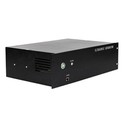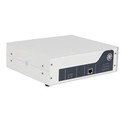Can an Ultrasonic Tank Filter be Used in Saltwater Tanks?
As a supplier of ultrasonic tank filters, I often receive inquiries from aquarium enthusiasts and professionals about the compatibility of our Ultrasonic Tank Filter with saltwater tanks. This blog post aims to provide a comprehensive analysis of this topic, drawing on scientific knowledge and practical experience.
Understanding Ultrasonic Tank Filters
Before delving into the suitability for saltwater tanks, it's essential to understand how ultrasonic tank filters work. Ultrasonic technology utilizes high - frequency sound waves to create cavitation bubbles in the water. These bubbles form, grow, and then collapse rapidly. The energy released during this collapse is powerful enough to dislodge and break down particles such as dirt, debris, and even some types of organic matter.
Our Ultrasonic Pipe Filter and Ultrasonic Tank Filter are designed to be efficient in removing contaminants from the water, improving water clarity and quality. The system can be adjusted to different frequencies and intensities depending on the specific requirements of the tank.
The Characteristics of Saltwater Tanks
Saltwater tanks have unique characteristics that differentiate them from freshwater tanks. The presence of salt changes the physical and chemical properties of the water. For instance, saltwater has a higher electrical conductivity compared to freshwater. This is due to the dissociation of salts into ions, which can carry an electric current.
Another important aspect is the presence of various marine organisms in saltwater tanks. These organisms have specific environmental requirements, including water quality, temperature, and pH. Maintaining a stable and clean environment is crucial for their health and survival. Additionally, saltwater can be more corrosive than freshwater, which can affect the materials used in tank equipment.
Compatibility of Ultrasonic Tank Filters with Saltwater Tanks
Material Considerations
One of the primary concerns when using an ultrasonic tank filter in a saltwater tank is the corrosion resistance of the filter's materials. Our ultrasonic tank filters are constructed using high - quality, corrosion - resistant materials. The housing is typically made of materials such as stainless steel or high - grade plastics that can withstand the corrosive nature of saltwater over an extended period. This ensures the longevity and reliability of the filter in a saltwater environment.
Impact on Water Chemistry
The ultrasonic cavitation process can have an impact on water chemistry. However, in a saltwater tank, the changes are usually minimal. The high - energy cavitation bubbles can cause some oxidation reactions, but the buffering capacity of saltwater helps to maintain the overall chemical balance. Our filters are designed to operate in a way that minimizes any significant changes to the water's pH, salinity, or other chemical parameters. In fact, by removing organic contaminants, the filter can contribute to a more stable water chemistry in the long run.
Effect on Marine Organisms
Marine organisms in saltwater tanks are sensitive to changes in their environment. The ultrasonic sound waves produced by our filters are carefully calibrated to avoid causing any harm to the organisms. The frequency and intensity of the sound waves are set within a range that is effective for filtration but does not cause stress or physical damage to the fish, corals, and other invertebrates in the tank. In some cases, the improved water quality resulting from the use of an ultrasonic tank filter can actually benefit the marine life by reducing the presence of harmful pathogens and pollutants.
Advantages of Using an Ultrasonic Tank Filter in Saltwater Tanks
Enhanced Filtration Efficiency
The ultrasonic technology provides a high - level of filtration that can effectively remove fine particles and organic matter that may not be captured by traditional filter systems. This helps to keep the water in the saltwater tank crystal clear, which is not only aesthetically pleasing but also beneficial for the health of the marine organisms.
Reduced Maintenance
With an ultrasonic tank filter, the frequency of manual cleaning and filter media replacement can be significantly reduced. The cavitation process continuously breaks down and removes contaminants, preventing them from accumulating in the tank. This saves time and effort for tank owners, allowing them to focus more on enjoying their saltwater aquarium.
Biological Balance
By removing excess organic matter, the ultrasonic tank filter helps to maintain a healthy biological balance in the saltwater tank. This reduces the risk of algae blooms and other water quality issues that can harm the marine life. A stable biological balance is essential for the long - term success of a saltwater aquarium.
Case Studies and User Experiences
Many of our customers have successfully used our ultrasonic tank filters in their saltwater tanks. For example, a marine research facility installed our filter in a large - scale saltwater tank housing a diverse range of coral species. They reported a significant improvement in water clarity and a reduction in the frequency of coral diseases. Another customer, an amateur aquarium enthusiast, noticed that the overall health and coloration of the fish in his saltwater tank improved after installing the ultrasonic tank filter.
Conclusion
In conclusion, an ultrasonic tank filter can be effectively used in saltwater tanks. Our filters are designed to address the unique challenges of saltwater environments, from material corrosion to the specific needs of marine organisms. The benefits of using an ultrasonic tank filter, such as enhanced filtration efficiency, reduced maintenance, and improved biological balance, make it a valuable addition to a saltwater tank.


If you are interested in learning more about our ultrasonic tank filters or are considering purchasing one for your saltwater tank, we encourage you to contact us for a detailed discussion. Our team of experts is ready to provide you with the information and support you need to make an informed decision.
References
- Smith, J. (2018). "Aquarium Water Quality Management". Marine Aquarium Press.
- Johnson, A. (2020). "The Impact of Ultrasonic Technology on Water Filtration". Journal of Aquatic Science.





